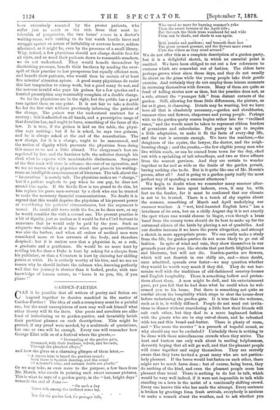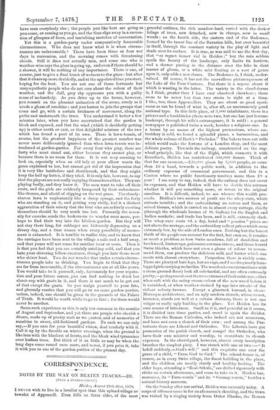GARDEN-PARTIES.
CAN it be possible that all writers of poetry and fiction are leagued together to deceive mankind in the matter of Garden-Parties ? The idea of such a conspiracy must be a painful one, but the most unsuspicious of men may well ask himself what other theory will fit the facts. Our poets and novelists are alike fond of introducing us to garden-parties, and invariably lavish their prettiest phrases on such descriptions. This might be proved, if any proof were needed, by a multitude of quotations, but one or two will be enough. Every one will remember how George Eliot tells us of a festival where the guests,— " Descending at the garden gate, Streamed, with their feathers, velvet, and brocade, Through the pleached alleys;" and how she gives us a charming glimpse of them later,— " A joyous hum is heard the gardens round ; Soon there is Spanish dancing, and the sound
Of minstrel's song, and autumn fruits are pluckt."
Or we may take, as even more to the purpose, a few lines from Mr. Morris, who excels in painting such sweet summer pictures. This is what be says of a garden-party, in the "hot, bright days" towards the end of June :—
" On such a day These folk among the trellised roses lay. . . . .. or did the garden lack for younger folk,
Who cared no more for burning summer's yoke Than the sweet breezes of the April-tide ; But through the thick trees wandered far and wide From sun to shade, and shade to sun again.
Both youths and maidens; and beneath their feet The grass seemed greener, and the flowers more sweet Unto the elders as they stood around."
We do not offer this as a complete description of a garden-party, but it is a delightful sketch, in which no essential point is omitted. We have been obliged to cut out a few references to customs which are somewhat out of fashion. The elders have perhaps grown wiser since those days, and they do not usually lie about on the grass while the young people take their gentle exercise. And certainly they do not employ these leisure moments in crowning themselves with flowers. Many of them are quite as fond of telling stories now as then, but the practice does not, as a rule, attract the "younger folk" from distant corners of the garden. Still, allowing for these little differences, the picture, as far as it goes, is charming. Details may be wanting, but we have here all that is absolutely necessary,—garden and shrubberies, summer-time and flowers, chaperons and young people. Perhaps with us the garden-party season begins rather late for "trellised
roses," and the words must be taken to represent ribbon borders of geraniums and calceolarias. But poetry is apt to require a little adaptation, to make it fit the facts of every-day life, and the rest is accurate enough. We have the maidens,—the daughters of the squire, the lawyer, the doctor, and the neigh- bouring clergy ; and the youths,—the few eligible young men who live within reach, or can be coaxed from town for the day, eked out with a sprinkling of tall schoolboys, and two or three officers from the nearest garrison. And they are certain to wander together as far and as wide as the limits of the garden permit, having nothing else to do. But is it quite like one of Mr. Morris's poems, after all ? And is going to a garden-party really the most perfect way of spending a summer afternoon?
We begin to doubt when we remember many summer after-
noons which we have spent indoors, even, it may be, with feet on the fender, for it must be confessed that our climate is not to be trusted. There is a touch of shy caprice about the seasons, something of March and April underlying our- summer weather. A "wet, bird-haunted English lawn" has a loveliness of its own, but on a chilly August day it is not exactly the spot where one would choose to linger, even though a brass- band from the county town should do its best to make up for the autumnal silence of the birds by playing a set of quadrilles. And our doubts increase if we leave the poets altogether, and attempt a sketch in more appropriate prose. We can easily make a study from the life, for garden-parties do not seem likely to go out of fashion. In spite of wind and rain, they show themselves in our grounds year after year, like shrubs that put forth blighted leaves and blossoms, but will not die. Garden-parties are flowers, which will not flourish in our chilly air, and— since doubt, once admitted, spreads ever faster—we may question whether they would be worth very much if they did. They do not har- monise well with the traditions of old-fashioned country-houses and English hospitality. There is something hollow and preten- tious about them. A man might be dull, and his entertainment poor, yet you felt that he had done what he could when he wel- comed you to his home. But there is something not quite so cordial about the hospitality which stops to shut the house-door before unfastening the garden-gate. It is true that the welcome„ such as it is, is widely diffused. People do not send out invita- tions to dinner without considering a little how their friends will suit each other, but they deal in a more haphazard fashion with the guests who are to stay out-of-doors, and be refreshed with tea and thin bread-and-butter. There is plenty of room, and "The more the merrier" is a proverb of hopeful sound, so why should any one be excluded ? Unluckily there is nothing to be done with these miscellaneous crowds when they arrive. The host and hostess can only walk about in smiling helplessness, devoutly hoping that all will go well, and that the pleasant people will come together and enjoy themselves. They are secretly aware that they have invited a great many who are not particu- larly pleasant. If the bores would but fasten on each other, there- might not be much harm done ; but of course, being bores, they do nothing of the kind, and even the pleasant people seem less pleasant than usual. There is nothing to do but to talk, which would be very well indeed, if it were not impossible to talk while standing on a lawn in the midst of a continually shifting crowd. Every one knows this who has made the attempt. Every sentence is broken by greetings from fresh arrivals, everybody is anxious to make a remark about the weather, and to ask whether you
have seen everybody else ; the people you like best are going as you come, or coming as you go, and the time slips away in a succes- sion of glimpses of faces, and tantalising snatches of conversation. Yet this is a garden-party under comparatively favourable circumstances. Who does not know what it is when circum- stances are unfavourable ? There have been three or four wet days in succession, and the morning comes with threatening clouds. Still it does not actually rain, and some one who is weather-wise says the glass is going up, and even if there should be a shower, it will be nothing of any importance. There is one, of course, just to give a final touch of wetness to the grass ; but after that it clears up more decidedly, and at the appointed time you start, hoping for the best. You are not one of those fortunate but unsympathetic people who do not care about the colour of their weather, and the dull, grey sky oppresses you with a guilty sense of melancholy. As you drive up to the house, however, you remark on the pleasant animation of the scene, sorely as it needs a gleam of sunshine ; and you hasten to join the groups that come and go, with a certain briskness of movement, along the paths and underneath the trees. You understand it better a few minutes later, when you have ascertained that the garden is bleak and exposed, and that the wind (which is decidedly getting up) is either north or east, or that delightful mixture of the two which has found a poet of its own. There is lawn-tennis, of course, but the greatest happiness of the greatest number was never more deliberately ignored than when lawn-tennis was in- troduced at garden-parties. For every four who play, there are forty who must stand out, either because they cannot play, or because there is no room for them. It is not very amusing to look on, especially when an old lady at your elbow wants the game explained to her, but cannot get rid of the impression that it is very like battledore and shuttlecock, and that they might keep the ball up better, if they tried. It is only fair, however, to say that the players are not really enjoying themselves either. They are playing badly, and they know it. The men want to take off their coats, and the girls are evidently hampered by their unbusiness- like dresses, and afraid of slipping on the wet grass. The closely- shaven lawn is unpleasantly like a damp sponge, and the forty who are standing on it, and getting very chilly, feel it a distinct aggravation of their misery that the four who are actively exerting themselves should be very much too hot. Presently the neces- sity for exercise sends the lookers-on to wander once more, per- haps to find their way into the kitchen-garden. But they will not stay there long, for cabbages are hideously depressing on a dreary day, and a time comes when every possibility of amuse- ment is exhausted. It is terrible to realise this, and to know that the carriages have been sent to the village a mile and a half away, and that yours will not come for another hour or more. Then it is that you feel that you arc certainly catching cold, and that you hate your shivering fellow-creatures, though you hate those most who shiver least. You do not wonder that under certain circum- stances people take to drinking. You begin to think that they are far from inexcusable, if the circumstances are at all like yours. You would take to it yourself, only, fortunately for your reputa- tion and your future career, you can find nothing to drink but claret-cup with gnats in it, and there is not much to be got out of that except the gnats. So you resign yourself to your fate, and gloomily resolve that you will go to no more garden-parties, unless, indeed, one should be given in the grounds of the Palace of Truth. It would be worth while to go to that ; for there would never be another.
Some such experience as this is only too common in the months of August and September, and yet there are people who cherish a dream, made up of poetry such as we quoted, and of memories of sunshine in sweet, old-fashioned gardens. To such we can only say,—If you care for your beautiful vision, deal tenderly with it. Call it up by the fireside on winter evenings, when the ground is like iron with the blackest of frosts, and the bleak wind tyrannises over leafless trees. But think of it as little as may be when the long days come round once more, and never, if you prize it, take it with you to one of the garden-parties of the present day.































 Previous page
Previous page